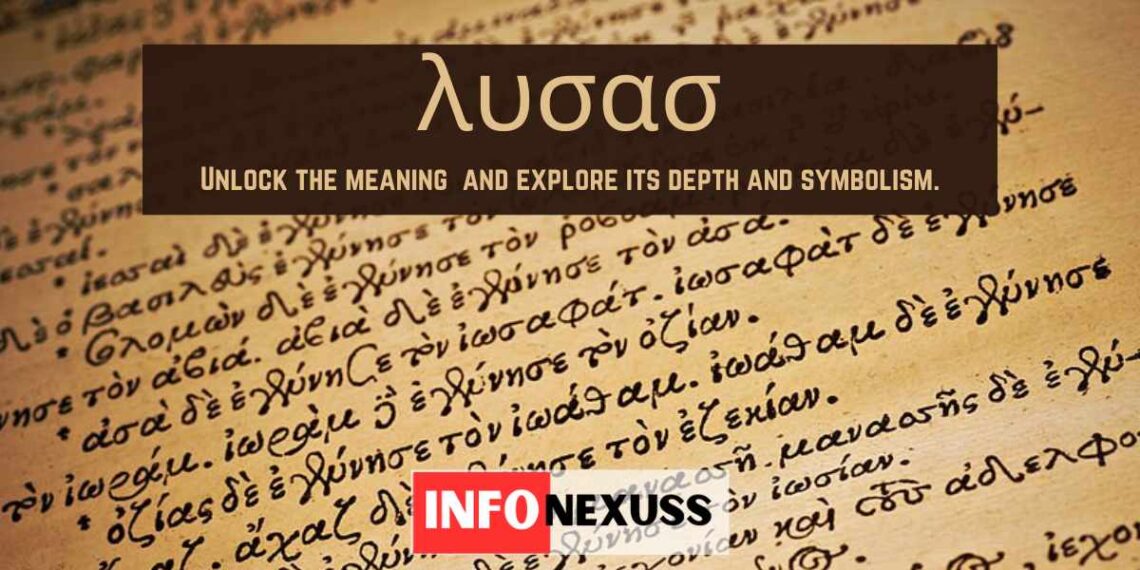
λυσασ: Release in Greek Language, Myth, & Beyond
From epic battles to the untangling of personal struggles, the ancient Greek word λυσασ holds a surprising depth. Discover its hidden power within language, myth, and the enduring human desire for release. At its core, λυσασ is the aorist participle of the verb λύω (lyō), meaning ‘to loose,’ ‘to release,’ or ‘to unbind.’ It takes a masculine, nominative singular form, implying a male subject performing the act of releasing.
This article is your guide to fully understanding λυσασ. We’ll delve into its grammatical role, explore its appearances in legendary Greek tales, and uncover the profound symbolism of release that continues to resonate across time.
Table of Contents
λυσασ: A Grammatical Breakdown
Understanding the grammatical nuances of λυσασ is key to grasping its full meaning. Let’s break it down:
The Aorist Tense: A Moment of Release
The aorist tense in ancient Greek is like a snapshot in time. It focuses on the essence of an action without dwelling on its duration or completion. When we see λυσασ, derived from the verb λύω (to loose, release, unbind), we’re witnessing the core moment of “releasing” itself.
The Function of Participles: Words with Dual Roles
Participles are fascinating because they’re born from verbs but act as adjectives. Think of them as shape-shifters in the world of language! λυσασ, stemming from the verb “to release,” can describe someone or something actively performing the act of releasing. For example, the phrase “ὁ λυσασ στρατιώτης” (ho lysas stratiōtis) translates to “The soldier who released…”
Declensions: The Many Forms of λυσασ
Ancient Greek is a language where nouns, verbs, and adjectives change their endings depending on their function within a sentence. For those with a deeper interest in Greek grammar, here’s a simplified declension chart of λυσασ:
| Case | Masculine | Feminine | Neuter |
|---|---|---|---|
| Nominative | λυσασ | λυσασα | λυσαν |
| Accusative | λυσαντα | λυσασαν | λυσαν |
λυσασ in Ancient Greek Literature and Mythology
The power of “releasing” echoes throughout ancient Greek storytelling. Here’s where we encounter λυσασ in its captivating context:
Textual Examples
- Homer’s Odyssey (Book 12): When Odysseus and his men face the Sirens, whose song lures sailors to their doom, Odysseus orders his crew: “…δεσμῷ με λύσατε…” “…loose me (λύσατε) from the bonds…” Here, λυσασ represents a desperate plea for liberation from a dangerous enchantment.
- Aeschylus’ Prometheus Bound: The Titan Prometheus, chained for defying Zeus, prophesies his eventual release: “λύσει μ’ ὁ λύσων γίγνεται…” “…he who shall release me (λύσων) is yet to be born…”. In this context, it embodies the hope for freedom from unjust punishment.
- Sophocles’ Philoctetes: The wounded hero Philoctetes, abandoned on an island, possesses the bow of Heracles, vital for Troy’s defeat. Odysseus plots to retrieve it: “λύσον … ἐκ δεσμῶν…” “Release (λύσον) him from his bonds…”. Here, λυσασ takes on a manipulative tone, as “releasing” is meant to serve a strategic purpose.
Mythological Figures
- Prometheus: Bound by Zeus for gifting fire to humanity, his eventual release embodies the triumph of defiance and the symbolic “loosening” of divine oppression.
- Gordian Knot: The legend tells of an intricately tied knot that an oracle foretold would be untied by the future ruler of Asia. Alexander the Great famously cut the knot instead, demonstrating a bold approach to “releasing” himself from the confines of the prophecy.
- Dionysus as Lysios: An epithet of the god Dionysus is “Lysios” (the Releaser). This links to his association with ecstatic rituals, seen as offering temporary liberation from social constraints.
The Symbolic Power of λυσασ
The act of “releasing” transcends mere grammar and historical tales. Let’s explore the deeper resonance λυσασ holds:
- Liberation and Resolution: Often, “releasing” symbolizes a breaking free, both physically and metaphorically. Think of a prisoner being released after serving their sentence, or a tense conflict finally resolving itself. It can represent the moment shackles are undone, the weight is lifted, and a new path becomes possible.
- Psychological Interpretations: Our inner lives can feel as bound as our bodies. The concept of “releasing” pent-up emotions like anger, grief, or fear holds immense power in psychological discourse. λυσασ hints at finding a way to express and let go of those burdens, allowing for healing and growth.
- Modern Language Connections: It’s fascinating to see how the root of λύω lives on in modern English. Words like:
- Analysis: The process of breaking down something complex for understanding.
- Catalyst: An agent that triggers or speeds up a reaction or change.
- Lysis: The dissolving or disintegration of something (like a cell).
These words all carry the underlying concept of “loosening” a previous state, whether it’s a tangled problem, a stubborn obstacle, or an existing form. This reminds us how timeless the desire for release truly is.
Conclusion
Our exploration has revealed that λυσασ is far more than a simple Greek word. It’s a verb participle indicating the act of release in the masculine form, a recurring motif in ancient Greek myths and literature, and a symbol of freedom, resolution, and transformation throughout human history.
Whether it’s the prisoner regaining liberty, the burdened heart finding emotional release, or the rigid system undergoing necessary change, the concept of “loosening” that which binds us remains undeniably powerful. From ancient times to our modern lives, the desire to break free is universal.
Your journey with λυσασ doesn’t end here! Keep an eye out for traces of its symbolism in literature, art, or even your own internal dialogues. Observe how the idea of “release” manifests in the world around you and within yourself. There are profound lessons to be discovered within this word’s ancient origins.
You May Also Like

“iamnobody89757” – Decoding the Digital Phenomenon
June 9, 2024
Pros and Cons of a Vasectomy
November 1, 2024

